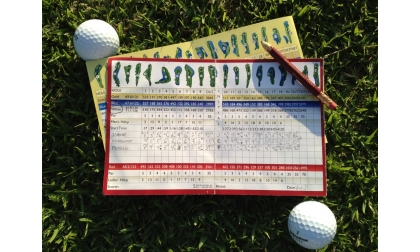Noticeable changes in Golf rules 2019 (Part 1)
21/01/2019 - Golf Tips
Visit website golfbooking.com.vn to book golf at all golf courses in Vietnam. Golfbooking | InterGolf gives you the best price of Northern golf courses, Central golf course and Southern golf course.
Golfbooking | InterGolf - Prices & Service always the best.
As of 2019, new golf rules apply worldwide. It is the most major revision of the rules for more than 30 years. We have summarized the most important changes for you.
(Part1)
1. Search time (Rule 18)

Previously, five minutes were available for finding a lost ball.
Now, the maximum search time is only three minutes.
Good to know: Most balls were previously found within three minutes and searching during the last two minutes was often unsuccessful – it is therefore not expected that this rule change will have a negative impact on scores.
2. Ball moved during a search (Rule 7)
.jpg)
Previously, the player usually incurred a penalty stroke if he moved his ball during a search.
Now, a mishap such as this is without penalty.
Good to know: You can therefore use your feet and your clubs when searching in thick grass without any consequences. The ball must be put back.
3. Identifying the ball (Rule 7)

Previously, if you wanted to pick up your ball to identify it, you had to inform a fellow-player in advance and give him the opportunity to observe the process.
Now, you no longer have to inform a fellow-player.
Good to know: If circumstances allow, it is still advisable to inform your fellow-players before you pick up your ball as a matter of courtesy and in order to avoid misunderstandings.
4. Club-length (Definition)

Previously, the player could use any of his clubs to measure out a club-length.
Now, a club-length is defined as the longest club in your bag, except for the putter.
Good to know: Using extra-long, “broom handle” putters for measuring is thus no longer allowed.
5. Dropping (Rule 14)

Previously, the ball had to be dropped shoulder height.
Now, you have to drop knee height.
Good to know: If you drop shoulder height out of habit don’t worry, just pick the ball up and drop it again correctly, without penalty.
6. Embedded ball (Rule 16)

Previously, the player only got relief if the ball had become embedded in a closely-mown area.
Now, you can take a free drop all embedded balls in the “general area”, including in the semi-rough and rough.
Good to know: Balls embedded in a bunker or in penalty areas still have to be played as they lie.
7. Wrong green (Rule 13)

If the ball lands on the wrong green, playing it there is not allowed, as this would most likely damage the green. However, if the ball only lands near the wrong green the player was previously permitted to stand on the wrong green to play his ball.
Now, you also have to take a free drop if you would have to take your stance on the wrong green.
Good to know: The spot for dropping is therefore now usually a bit further away the green.
8. Ball hits the player or equipment (Rule 11)

Previously, a penalty stroke was incurred if the player hit himself or his own equipment.
Now, this is without penalty provided it happened accidentally.
Good to know: You are therefore not allowed to use your equipment or your foot as a ball stopper.
9. Double hit (Rule 10)

Previously, a penalty stroke was incurred if the club got stuck when a stroke was played and, as a result, the ball was hit more than once.
Now, a mishap such as this is without penalty.
Good to know: A double hit therefore just counts as one stroke.
10. Touching the sand in the bunker (Rule 12)

Previously, touching the sand in the bunker before the stroke was not permitted, except for very few exceptions.
Now, touching the sand incidentally is basically allowed, i.e. you are permitted to lean on your club. However, you are still not allowed to test the condition of the sand before the stroke is played, improve the line of play, ground the club in front of or behind the ball or touch the sand during practice swings.
Good to know: You therefore now do not have to be extra careful in bunkers, especially if you are not very close to the ball.
(expertgolf.com)
-

GOLF BOOKING QUOTATION OCTOBER
-

QUOTATION GOLF BOOKING JULY
-

GOLF BOOKING QUOTATION MAY 5
-
![[HOT-HOT-HOT] PRICE LIST FOR MARCH GOLF BOOKING AT INTERGOLF](https://intergolf.vn/images/news/2021/03/resized/bang-gia-dat-san-golf--thang-3_app_1614762320.jpg)
[HOT-HOT-HOT] PRICE LIST FOR MARCH GOLF BOOKING AT INTERGOLF
-

PLAY GOLF-GET 100,000,000 VND
-

VINPEARL GOLF COURSE PLAY 4 PAY 3
-

The opening schedule of golf courses nationwide and the price...
-
![[HOT PROMOTION INTERGOLF 2021] - GOLF QUOTATION OF JAN 2021](https://intergolf.vn/images/news/2021/01/resized/price-list-of-expensive-golf-courses-in-january-2021-app_1609836305.jpg)
[HOT PROMOTION INTERGOLF 2021] - GOLF QUOTATION OF JAN 2021
-
![[INTERGOLF - PROMOTION] May 2020 Golf Booking Quotation - Booking Tee Time](https://intergolf.vn/images/news/2020/05/resized/bang-gia-golf-thang-5-web_conen_1588756441.jpg)
[INTERGOLF - PROMOTION] May 2020 Golf Booking Quotation -...
-
![[INTERGOLF - PROMOTION] March 2020 Golf Booking Quotation](https://intergolf.vn/images/news/2020/03/resized/bang-gia-dat-choi-golf--thang-3-_-golf-booking_1583316602.jpg)
[INTERGOLF - PROMOTION] March 2020 Golf Booking Quotation

 Viet Nam
Viet Nam
 English
English



![[INTERGOLF - Khuyến mại - PROMOTION] BẢNG GIÁ ĐẶT GIỜ CHƠI GOLF THÁNG 7/2018 - July 2018 InterGolf Booking Quotation](https://intergolf.vn/images/news/2018/07/resized/bang-gia-dat-san-golf-t7_2_1531367598.jpg)


![[Khuyến mại - PROMOTION] INTERGOLF XIN THÔNG BÁO BẢNG GIÁ THÁNG 4/2018 - GOLFBOOKING SUMMER PROMOTION](https://intergolf.vn/images/news/2018/04/resized/avatar-youtube_1524109074.jpg)
![[Khuyến mại - PROMOTION] Đặt sân tam đảo - Tam Đảo Golf Course Promotion](https://intergolf.vn/images/news/2018/04/resized/km-dat-san-tam-dao---tam-dao-golf-course-promotion_1524107972.jpg)










